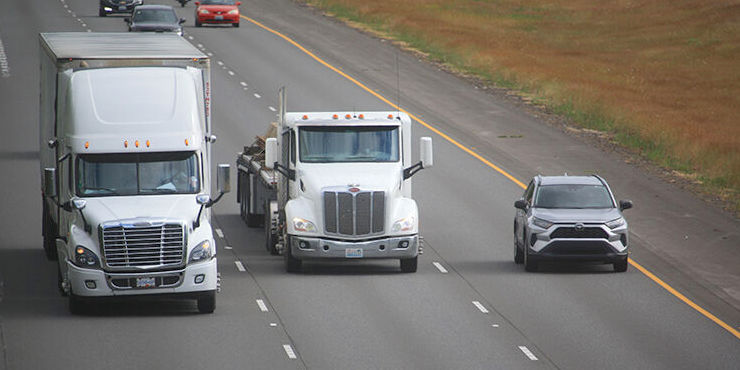Oregon’s electric truck mandate delayed due to market dysfunction
Published 5:05 pm Thursday, May 15, 2025

- Dysfunction in the market for new trucks has convinced Oregon environmental regulators to delay enforcement of the state’s electric truck sales mandate for two years. (Capital Press file photo)
Dysfunction in the market for new trucks has convinced Oregon environmental regulators to delay enforcement of the state’s electric truck sales mandate for two years.
Despite “compliance flexibilities” to ease adoption of the “advanced clean truck” regulation, the state’s Department of Environmental Quality said that “new truck market dynamics in Oregon are not functioning properly” — much as critics of the mandate have been forecasting.
“Some manufacturers are limiting new internal combustion engine truck sales as a means to ensure compliance with ACT sales requirements, thereby reducing overall new truck availability to a wide range of users,” the agency said.
While critics have long been warning DEQ about the adverse impacts of the mandate, the fulfillment of those predictions has prompted the agency to take action, said Rep. Shelly Boshart-Davis, R-Albany, who’s been advocating for the delay.
“This rule affected everyone, from the one-man shop to the big business like Daimler,” she said, referring to a truck manufacturer whose North American operations are based in Portland, Ore.
The fundamental problem is that demand for electric trucks simply isn’t keeping with the rate of sales required of manufacturers, said Boshart Davis, whose family runs a farming and trucking operation.
“They’re sitting on all this EV inventory nobody wants,” she said, referring to electric vehicles.
Under the “advanced clean trucks” rule, which is meant to reduce the state’s carbon emissions, 40-75% of the new trucks sold in Oregon will have to be electric by 2035, depending on the vehicle class.
Though the percentage of electric vehicle sales will rise gradually over the next decade, and manufacturers will be able to buy credits to comply with the requirements, opponents claimed the mandate would restrict the number of diesel trucks available.
Critics argued manufacturers would likely constrain sales of diesel trucks to ensure they don’t outpace sales of electric trucks beyond the threshold allowed under the rule.
In other words, if electric truck sales remain low, that will necessarily limit how many diesel trucks are available for sale.
According to DEQ, that’s exactly what’s been happening since the mandate went into effect at the beginning of this year.
“In particular, the preferred compliance strategy of manufacturers not delivering internal combustion engine trucks to Oregon’s market to avoid accruing any deficits is failing to meet the needs of dealers and fleets,” according to DEQ.
In addition to the “current lack of available vehicles,” the decision not to enforce the regulation in 2025 and 2026 was also motivated by “federal activities that threaten incentives and investments” in electric vehicles, according to DEQ.
Not only has the Trump administration cast doubt on the future of programs meant to spur sales of electric vehicles and construction of charging stations, but Congress may eliminate the legal foundation for the regulation, the agency said.
State governments are currently allowed to follow either federal emissions standards or those set by California, which developed the electric truck sales mandate.
However, Congress may withdraw permission for California to set the electric truck mandate, which would effectively block Oregon from enforcing the regulation as well.
“Collectively, these activities at the federal level are creating significant uncertainty,” according to DEQ.
As much as the state government would like to point at federal decisions, political pressure within Oregon was likely a bigger factor in DEQ’s decision, said Bosthart Davis.
The regulation has resulted in lost sales and jobs consistently with expectations, leading to bipartisan support for legislation that would’ve forced the agency to delay enforcement, she said.
Several Democrats signed on to sponsor a bill introduced by Boshart Davis that would’ve postponed the mandate, which died in committee earlier this year.
Though that proposal did not move forward, the Joint Transportation Committee was soon scheduled to vote on an amendment to another bill that would’ve had the same effect.
The timing of DEQ’s announcement was likely no coincidence, Boshart Davis said.
The enforcement delay will provide trucking companies with at least a couple years of breathing room — or longer, depending on Congressional action — during which electric trucks may progress or other technology will offer an alternative, she said.
For now, though, electric trucks simply don’t have enough range or charging stations to be practical, Boshart Davis said. For example, the containers of straw her family ships overseas are too heavy for electric trucks to handle.
“EVs simply don’t work in most trucking applications,” she said.
The DEQ’s decision was criticized by several groups advocating for reduced carbon emissions, including the Oregon Environmental Council, Climate Solutions and the Oregon League of Conservation Voters, who called it “a major setback to clean air and climate progress.”
The conservation groups said the agency was “bowing to oil and gas interests and truck manufacturers,” who were trying to more broadly delay clean truck regulations as part of a “nationally orchestrated multi-state campaign.”
Postponing the regulation’s enforcement will result in $93 million in “avoidable healthcare costs” and $30 billion in “lost energy savings” while making Oregon a “dumping ground for the most polluting diesel trucks” that can no longer be sold in California or Washington, the groups said.






